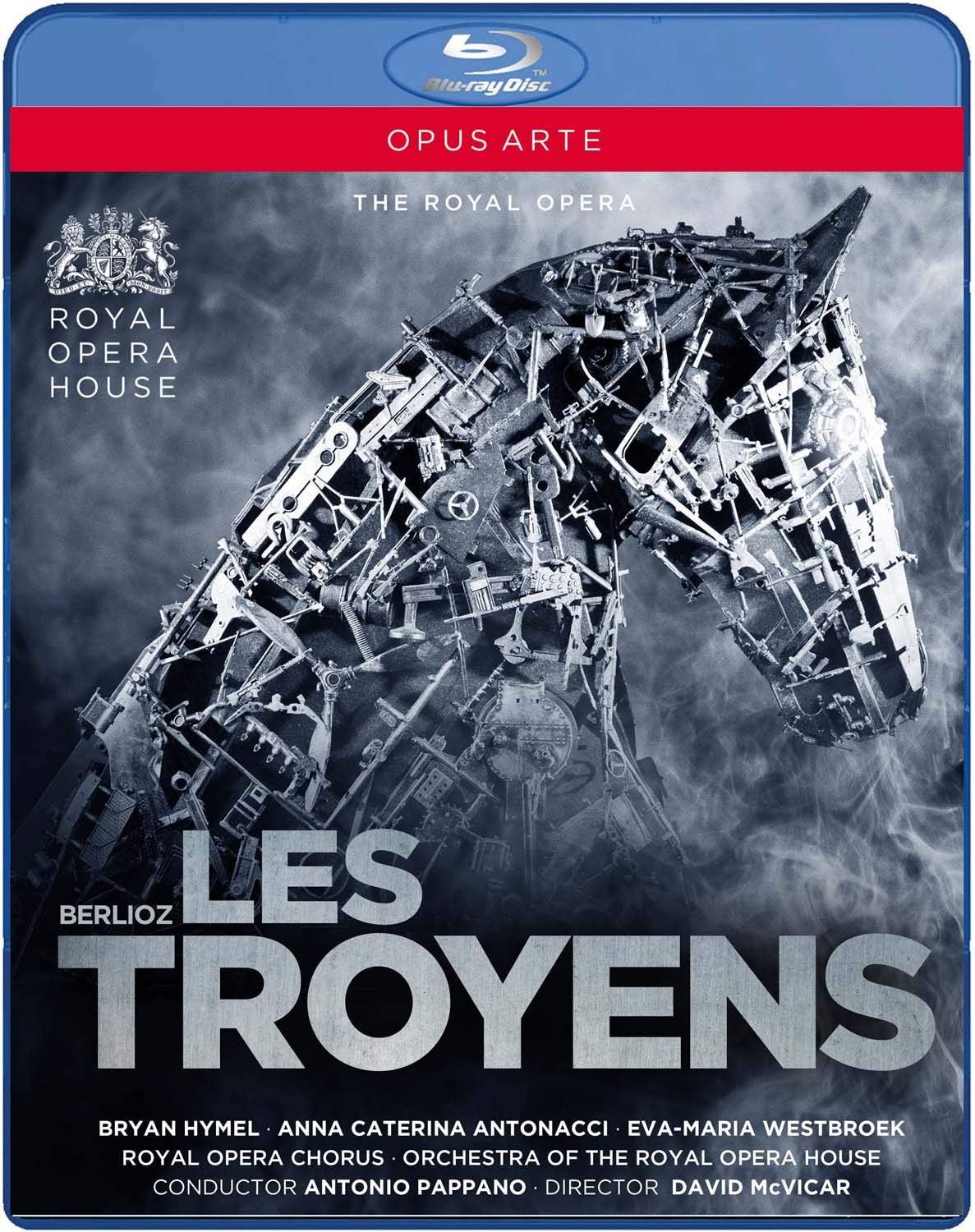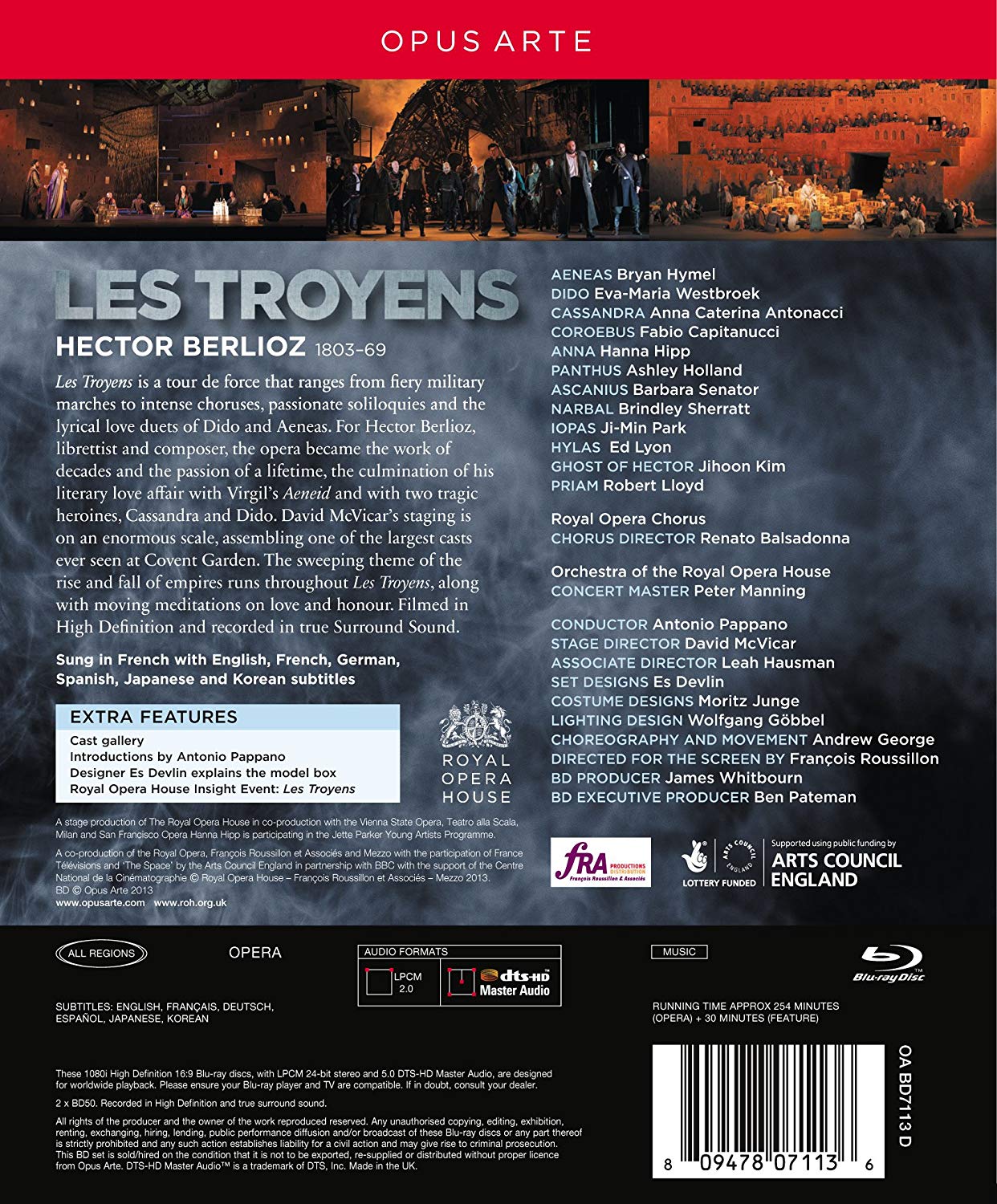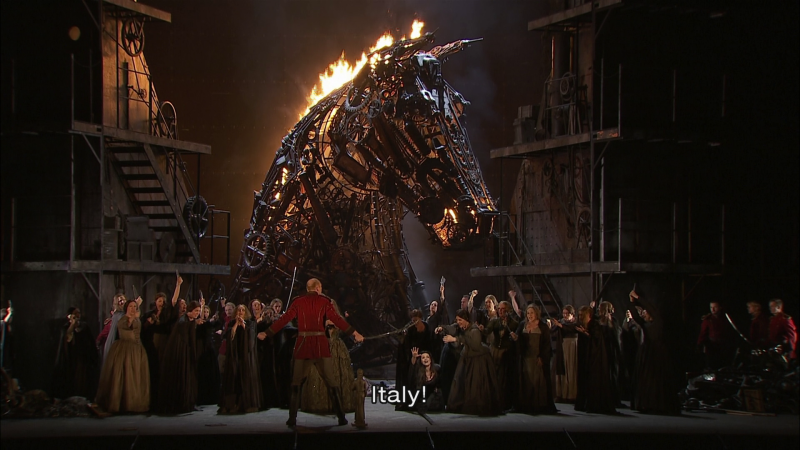

Berlioz Les Troyens opera to libretto by the composer. Directed 2012 by David McVicar (Associate Director Leah Hausman) at the Royal Opera House. Stars (appearance order): Anna Caterina Antonacci (Cassandra), Fabio Capitanucci (Coroebus), Ashley Holland (Panthus), Ji Hyun Kim (Helenus), Barbara Senator (Ascanius), Pamela Helen Stephen (Hecuba), Robert Lloyd (Priam), Jenna Sloan (Polyxena), Sophia McGregor (Andromache), Sebastian Wright (Astyanax), Bryan Hymel (Aeneas), Jihoon Kim (Ghost of Hector), Lukas Jacobski (Greek Captain), Eva-Maria Westbroek (Dido), Hanna Hipp (Anna), Ji-Min Park (Iopas), Brindley Sherratt (Narbal), Daniel Grice (Soldier, Voice of Mercury), Ed Lyon (Hylas), Adrian Clarke (First Soldier), and Jeremy White (Second Soldier). Antonio Pappano conducts the Royal Opera Orchestra (Concert Master Peter Manning) and Chorus (Chorus Director Renato Balsadonna). Sets by Es Devlin; costumes by Moritz Junge; lighting by Wolfgang Göbbel; choreography and movement by Andrew George. Directed for TV by François Roussillon; produced for Blu-ray by James Whitbourn; Executive Producer Ben Pateman. Sung in French. Released 2013, two-disc set has 5.0 dts-HD Master Audio sound. Grade: A
This is the second of 3 coordinated reviews of Les Troyens. The first review is of the Châtelet verson from 2003. (If you need to brush up on Greek and Roman myth, I suggest you read the Châtelet review now.) The third version is the Valencia show staged by La Fura dels Baus. In this review of the Royal Opera House version, I'll use the English names of the characters.
When the Greek armies suddenly depart Troy after 10 years of siege, the Trojans believe they have won the war. They flood out before the walls for fresh air and to behold the giant horse left behind by the Greeks:
Only the seer Cassandra (Anna Caterina Antonacci) and the Priest Laocoön see that the Trojans are letting down their guard. They fear the Greeks soon will be back. Antonacci sang the role of Cassandra to great acclaim 9 years earlier at the Châtelet when she was about 41 years old. In this subject title from 2012, Antonacci was about 50. Cassandra is still engaged to Coroebus (Fabio Capitanucci), of course, but Director McVicar doesn't try to direct her as a teenager. Instead he makes her into something of an eccentric old maid who comes slightly unhinged from time to time and falls to making convulsive gestures when under stress. This is a difficult partner for Capitanucci to relate to; he mostly stands and delivers. McVicar also paints big eyes on Antonacci's palms, which makes her look stranger still:
The Trojans ignore Cassandra's warnings. King Priam (Robert Lloyd) assembles his court for a ceremony of thanksgiving. This scene was directed poorly in the Châtelet show. But McVicar wrings everything possible from the grand, sonorous music Berlioz provided for the event. First McVicar provides interesting costumes for the members of Priam's family. Here is the old king, who turns out to be all but blind (in those days there were no 20-minute cataract replacement operations):
The elegant Queen Hecuba:
Andromache (Sophia McGregor), the widow of Hector in mourning, appears at court with her son Astyanax (Sebastian Wright). These are both silent roles. In the myth, Astyanax is very young as shown here:
When Andromache and later her son pray at the alter, Berlioz's music wells up and tears start to flow in my home theater. And neither Andromache nor her son makes a sound:
Astyanax means "Lord of the City"—the heir to the throne—and he receives the blessing of Priam. Only Cassandra knows that within hours the Greeks will kill Astyanax and take away his mother in slavery. And not even Cassandra knows that one day Andromache will marry a son of Achilles and sit on a Greek throne:
This thanksgiving scene has quite a bit to it. Every person appearing in it is directed as carefully as you would expect in a major motion picture, and it all makes every bar that Berlioz wrote for this seem urgently important. This is a good example of how stagecraft can contribute to the success of an opera:
Aeneas arrives at court to report how Laocoön tried to burn the horse on the beach but was killed by serpents that came out of the sea and . . . !
A wonderful octet bemoans the fate of Laocoön. From left to right: Coroebus, Helenus (Ji Hyun Kim), Cassandra, Piram, Hecuba, Aeneas, Panthus (Ashley Holland), and Aeneas's son Ascanius (Barbara Senator):
The Trojans breach their wall so they can drag the horse to the temple at the heart of the city. The Royal Opera went all out for an impressive horse that is motorized, has its own driver, and can spout fire:
In Act II, The ghost of Hector wakes Aeneas. Greeks spilled out of the horse, took the city guards by surprise, and other Greeks poured into the city through the breached wall. Troy is falling. But Aeneas and his best men should flee the city and sail for Italy, where they will found the Roman people and state. All of this was invented so that Julius Caesar and his relatives could claim to be descendants of the goddess Venus, who was the mother of Aeneas:
Cassandra breaks the bad news to her beautiful sister Polyxena (Jenna Sloan). Coroebus died fighting beside their brothers and Troy is lost:
The women must die or submit to slavery. But Aeneas has escaped to found a new and better Troy in . . . :
In Act 3 the scene shifts to Carthage, a Mediterranean seaport in North Africa ruled by Queen Dido. Here the people gather at the palace for a celebration:
Meet Dido (Eva-Maria Westbroek) and her sister Anna (Hanna Hipp). Before them stands a mysterious young man. He is Ascanius, the son of Aeneas. This is a trouser role, here played by Barbara Senator:
Dido harbors Aeneas. He and his battle-tested warriors in turn offer to help defend Carthage from marauding tribesmen attacking Carthage from the south. At the end of Act 3, everyone sings "To Arms:"
Dido and Aeneas defeat the African tribes after the end of Act 3. There then follows an Interlude called the The Royal Hunt and Storm. Nymphs and fauns dance as lasciviously as the law allows to Berlioz's wildest music. Dido and Aeneas yield to temptation and make love surrounded by burning bushes. I guess this was soft-porn in 1858:
In Act 4, Anna is elated to see Dido and Aeneas in love. Carthage needs a king like Aeneas:
There follows several of the longest and most beautiful love scenes in opera. Act 4 looks fine in my home theater, but the light level is too low to yield good screenshots. Here my best effort to show you the famous septet and the final duet:
In Act 5, God sees that his plan for establishing Rome is going awry. He sends Mercury to order Aeneas to sail immediately for Italy. The jilted Dido begs Aeneas to stay just long enough to give her a child, but Aeneas turns her down:
Distraught, Dido mounts her funeral pyre:
The people of Carthage are now the enemy of the Romans forever. Before the image of Hannibal, the people pray, "Let our descendants one day terrify the world with their slaughter." This is, by the way, the second and more dramatic of the two endings Berlioz wrote for Les Troyens.
In the 2014 Annual Classical Music Awards issue, Gramophone (page 39) called this the 2d place winner of the Opera recording category—in its DVD version. The editor didn't even know that it's also out in a superior Blu-ray version. Richard Lawrence in the January 2014 Gramophone at page 74 makes the following statement about this production, "It is magnificent." He was certainly correct as to the sets, costumes, props, and general stagecraft. The modern-instrument orchestra under Papano is also magnificent. McVicar gives us a decent interpretation of the Royal Hunt and Storm. All technical aspects of the recording and disc authorship are admirable. In particular, François Roussillon manages to get beautiful images throughout despite McVicar's dark stage. Opus Arte has published this in a special package with a lavish keepcase booklet.
But I would have some reservations about the singing in this production. Antonacci was magnificent as Cassandra in 2003 (Châtelet verson); in 2012 her singing is less natural and more mannered. All the other singers are fine, but perhaps not quite at the exalted level of the singers at the Châtelet. And with all the emphasis on stagecraft, perhaps there was less time at the Royal Opera to work on the blending of the voices that is so magical in the Châtelet recording.
So if you want the better all-around show, try the Royal Opera House version first. Then get the Châtelet version to experience the difference in singing that is merely excellent and singing that is sublime. So I wind up with an A grade for the ROH recording.
Here's the official ROH trailer:
OR

































